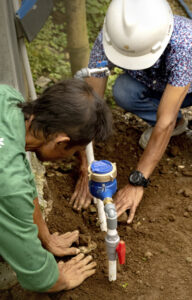Discover
An asset manager focused on water and sanitation: WaterEquity
Inspire
Clean water provides health, resilience, and stability to communities
Invest
Investing in the most basic things in life often has the greatest impact
By Elan Emanuel for GreenMoney
Access to safe water and sanitation is a fundamental human right under binding international law. Yet today, a global water crisis still persists. 2.2 billion people—or 1 in 4—still lack access to safe water and 3.5 billion people—or 2 in 5—lack access to safely managed sanitation.
While gains have been made over several decades, the effects of climate change have become a large and looming factor, halting progress made. Though the role of the public sector remains paramount in addressing the crisis, private impact investment has recently also emerged as a powerful tool.
Impact investing focuses on generating positive social and environmental impact while seeking financial returns. In the realm of water and sanitation, investment plays a pivotal role in supporting innovative solutions, especially at the household level. Among low-income consumers, at least 600 million people could access water and sanitation products, services and upgrades if financing was available, equating to what WaterEquity estimates as $35 billion of market demand over the next decade.
WaterEquity has approached this market opportunity through an investment strategy focused on providing debt capital to financial institutions in emerging markets to expand water and sanitation lending. These financial institutions use this capital to grow their water and sanitation microloan portfolios, as well as to on-lend to local enterprises delivering water and sanitation innovations, products and services.
Since our start in 2016, WaterEquity has deployed more than $360 million in capital to this strategy across four private investment funds, reaching more than 5 million people with increased access to safe water and sanitation.
Over 93 percent of the low-income end-clients taking out these microloans are women. This is no accident, as the funds have specifically targeted women beneficiaries by integrating gender into our investment and decision-making processes. And the microloans are repaid at the average rate of 97-99% within 12-24 months. Ensuring equitable access to safe water and sanitation cannot be accomplished without giving women the power and the capital to solve for their futures.

Financing the “last mile” of water and sanitation access at the household level will only take us so far in reaching the billions affected. There is also a tremendous need and market opportunity for sustained investment in potable and wastewater infrastructure seeking to increase access to water and sanitation services, improve water quality and mitigate the impacts of water scarcity.
Moreover, with traditional infrastructure often vulnerable to damage from extreme weather events, investment in resilient systems is essential for ensuring sustainable access to water and sanitation services.
By investing in climate-resilient infrastructure, WaterEquity’s Water & Climate Resilience Fund aims to reach 15 million people with water and sanitation access, and indirectly benefit millions more through improvements in water quality and scarcity.
Investments include government tendered projects such as the construction of decentralized water treatment plants, the upgrading of existing infrastructure to withstand extreme weather events and the implementation of smart water management systems. The Fund will also invest directly in growth companies that are developing and deploying innovative technology and services within the sector. These projects and companies enhance the reliability and efficiency of water and sanitation systems at scale, while also contributing to the overall climate resilience of underserved communities.
Impact investing has the potential to transform the landscape of water and sanitation, addressing the complex challenges posed by the water crisis, climate change, and gender disparities. By supporting innovative household solutions and investing in climate-resilient infrastructure, impact investors can contribute to the Sustainable Development Goals and improve the well-being of communities around the world, aligning values with the potential for financial returns.
This holistic approach not only addresses immediate water and sanitation challenges but also builds resilient communities capable of withstanding the impacts of a changing climate. Through strategic and socially responsible investments, we can ensure a future where safe water and sanitation are accessible to all.
Read more from Green Money: The future of water: Impacting businesses and communities
Elan Emanuel is the chief investor relations officer at WaterEquity. Elan is responsible for mobilizing investments and partnerships with a broad portfolio of investors to accelerate WaterEquity’s impact addressing the global water and sanitation crisis. WaterEquity emerged out of Water.org and was cofounded by actor Matt Damon and Gary White.
This story originally appeared on Green Money.